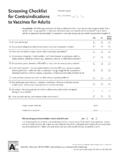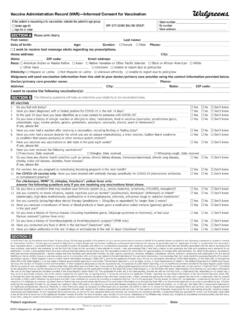Transcription of Contraindications - World Health Organization
1 Contraindications General All infants should be immunized except in these three rare situations:1. Anaphylaxis or a severe hypersensitivity reaction is an absolute contraindication to subsequent doses of a vaccine . Persons with a known allergy to a vaccine component should not be Do not give BCG or yellow fever vaccine to an infant that exhibits the signs and symptoms of in practice: a practical resource guide for Health workers 2004 update_____Module 2: The vaccinesWHO/ IDYearThe following are not Contraindications .
2 Infants with these conditions should be immunized: allergy or asthma (except if there is a known allergy to a specific component of the vaccine mentioned above); any minor illness, such as respiratory tract infections or diarrhoea with temperature below C; family history of adverse events following immunization; family history of convulsions, seizures, or fits; treatment with antibiotics; known or suspected HIV infection with no signs and symptoms of AIDS; signs and symptoms of AIDS, except as noted above (see 2_20); child being breastfed; chronic illnesses such as chronic diseases of the heart, lung, kidney, or liver stable neurological conditions, such as cerebral palsy or Down s Syndrome; premature or low-birthweight (vaccination should not be postponed); recent or imminent surgery; malnutrition.
3 And history of jaundice at in practice: a practical resource guide for Health workers 2004 update_____Module 2: The vaccinesWHO/ IDYear14 February 2008 Page 1 of 17 ContraindicationsIf a reaction does occur, Health workers should report the problem to supervisors immediately. Children who have a severe reaction to a vaccine should not receive additional doses of that in practice: a practical resource guide for Health workers 2004 update_____Module 2: The vaccinesWHO/ IDYearAll infants should be immunized except in these three rare situations:1.
4 Anaphylaxis or a severe hypersensitivity reaction is an absolute contraindication to subsequent doses of a vaccine . Persons with a known allergy to a vaccine component should not be Do not give BCG or yellow fever vaccine to an infant who exhibits the signs and symptoms of AIDS (see Appendix 6_11A). Other vaccines should be If a parent strongly objects to an immunization for a sick infant, do not give it. Ask the mother to come back when the infant is following are not Contraindications . Infants with these conditions should be immunized (see Appendix 6_11B)12 Page2004 Immunization in practice: a practical resource guide for Health workers 2004 update_____Module 6: Holding an immunization sessionWHO/ IDYearChildren who have a severe reaction to a vaccine should not receive additional doses of that in practice: a practical resource guide for Health workers 2004 update_____Module 6.
5 Holding an immunization sessionWHO/ IDYearBCG All infants should be immunized except in these three rare situations:1. Anaphylaxis or a severe hypersensitivity reaction is an absolute contraindication to subsequent doses of a vaccine . Persons with a known allergy to a vaccine component should not be Do not give BCG or yellow fever vaccine to an infant that exhibits the signs and symptoms of in practice: a practical resource guide for Health workers 2004 update_____Module 2: The vaccinesWHO/ IDYear14 February 2008 Page 2 of 17 ContraindicationsAll infants should be immunized except in these three rare situations:1.
6 Anaphylaxis or a severe hypersensitivity reaction is an absolute contraindication to subsequent doses of a vaccine . Persons with a known allergy to a vaccine component should not be Do not give BCG or yellow fever vaccine to an infant who exhibits the signs and symptoms of AIDS (see Appendix 6_11A). Other vaccines should be If a parent strongly objects to an immunization for a sick infant, do not give it. Ask the mother to come back when the infant is following are not Contraindications . Infants with these conditions should be immunized (see Appendix 6_11B)12 Page2004 Immunization in practice: a practical resource guide for Health workers 2004 update_____Module 6: Holding an immunization sessionWHO/ IDYearInfants and children with symptomatic human immunodeficiency virus (HIV) or those known to have other immunodeficiency states should not be vaccine (WHO position paper)Weekly Epid.
7 Record (2004, 79: 27-38)50_3 Database IDYearBCG vaccination is indicated for all infants living in areas where TB is highly endemic (concerning HIV, see below); for infants and children at particular risk of TB exposure in otherwise low-endemic areas; for persons exposed to multidrug-resistant Mtb (impact not established.)BCG vaccination is contraindicated for persons with impaired immunity (symptomatic HIV infection, known or suspected congenital immunodeficiency, leukaemia, lymphoma or generalized malignant disease); for patients under immunosupressive treatment (corticosteroids, alkylating agents, antimetabolites, radiation); in vaccine (WHO position paper)Weekly Epid.
8 Record (2004, 79: 27-38)50_13 Database IDYear14 February 2008 Page 3 of 17 ContraindicationsHIV-positive infants may receive BCG vaccine only when asymptomatic and living in areas where TB is highly endemic. Long-term follow-up of such children following vaccination is desirable. HIV-positive, asymptomatic infants in low-burden areas should not be BCG-vaccinated. Indications for vaccination of groups likely to contract HIV should always be considered carefully. The efficacy of BCG vaccination in HIV-infected infants is not vaccine (WHO position paper)Weekly Epid.
9 Record (2004, 79: 27-38)50_14 Database IDYearGiven the high risk of acquiring TB and the low risk of serious adverse events following BCG vaccination of HIV-exposed neonates, WHO maintains that, in HIV-infected areas, all neonates be given BCG. Older infants or children suspected of being HIV-infected should not be vaccinated if they have symptomatic disease or other evidence of vaccine (WHO position paper)Weekly Epid. Record (2004, 79: 27-38)50_15 Database IDYearThere are few population-based data on the effectiveness, or otherwise, of BCG vaccine in preventing severe tuberculosis in HIV-positive infants.
10 Given the high prevalence of HIV and tuberculosis in certain countries and of the current development of new tuberculosis vaccines, some of which are based on BCG, GACVS advises no change in the current recommendations for BCG immunization of infants in countries with a high prevalence of tuberculosis and that population-based studies should be undertaken to determine the efficacy and safety of BCG and related vaccines in HIV-negative and HIV-positive children in countries with a high endemic rate of Advisory Committee on vaccine Safety, 3 4 December 2003 Weekly Epid.















